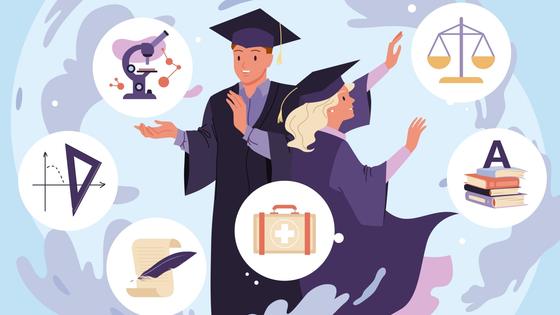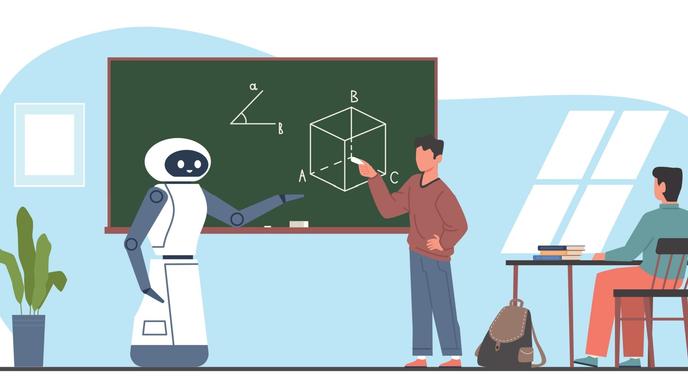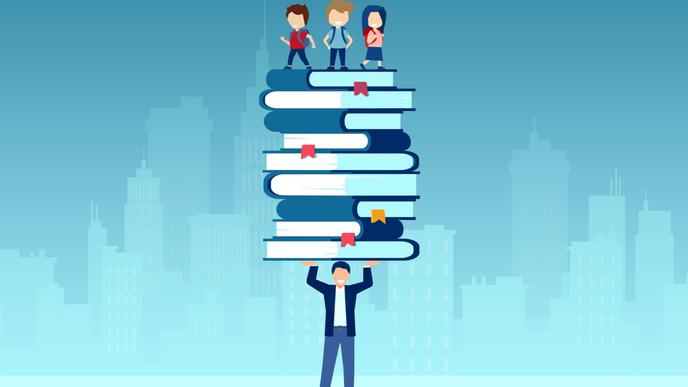More Than a Function: What Will Teachers Teach in the Future?
The teaching profession is changing — and fast. Artificial intelligence now writes texts, grades assignments, and even helps students learn.

Around the world, education systems are rethinking traditional formats: in some places, children study in the metaverse; in others, they're guided by digital tutors. And yet one thing remains unchanged - people still need people.
Amid all these shifts, the teacher is no longer simply «the one who knows more». They are someone who helps make sense of complexity, offers support, guidance, and a sense of stability. Global trends confirm it: the future of education is not just about AI, but about human connection. So what role will teachers play in a world where classrooms are filled with students raised on ChatGPT and YouTube? Let's find out.
How Is the Educational Landscape Changing?
Automation of routine tasks - grading, creating personalized learning plans, basic content delivery - is already transforming day-to-day teaching. In Australian schools, for example, the EdChat chatbot analyzes students' written work, instantly identifying gaps in grammar and style, freeing up teachers to focus on meaningful feedback.
But a teacher's true value lies not in delivering information, but in cultivating students' critical thinking, creativity, and emotional intelligence. As Kristen DiCerbo from Khan Academy notes, AI is becoming a tool that doesn't replace the teacher - it amplifies their impact.
In China, this human-technology synergy is taking unexpected forms: some universities are experimenting with "digital twins" of professors - AI avatars available 24/7 to help students reinforce material and answer questions.
From Information Transmitter to Learning Mediator

In a world where knowledge is widely accessible, the teacher's role is shifting from that of an information transmitter to a mediator who helps students:
-
Navigate the noise (for example, distinguishing facts from misinformation),
-
Develop soft skills (critical thinking, collaboration, emotional intelligence),
-
Build personalized learning paths.
Concepts like «teacher as a mentor» or «learning coach» highlight the importance of this transformation, emphasizing tailored educational journeys. In some countries, a reverse mentoring model is gaining popularity - students teach teachers how to use AI tools and digital platforms, fostering a culture of mutual skill exchange.
The teacher of the future, then, is first and foremost a mentor - someone who not only shares knowledge but helps students acquire the competencies needed to thrive in a rapidly changing world.
Educational Ethics in the Age of AI
The spread of AI raises tough questions for education: how do we assess knowledge when a neural network can complete an assignment in seconds? Educators are meeting this challenge by rethinking tasks - focusing more on oral defenses, group projects, and primary research.
At the same time, detection systems like Turnitin AI Detection are being implemented, but the emphasis is shifting from surveillance to fostering a culture of trust and ethical tech use.
According to Inside Higher Ed, 18% of U.S. colleges have already adopted official policies on AI use, with another 59% currently developing them. These aren't just formalities - they're an effort to define new rules of engagement that are fair, transparent, and relevant in a world of digital abundance.
Teachers are central to shaping students' ethical relationship with AI. Artificial intelligence is no longer an abstract concept of the future - it's part of our everyday lives and learning environments. There's no point in running from it; it's far more important to learn how to use it consciously and responsibly. That's why educators must go beyond explaining the risks and limitations of AI. They must nurture critical thinking, digital hygiene, and the ability to distinguish reliable data from fakes.
Trust and Authority: Who Does Generation Alpha Believe In?

In the era of digital tech and AI, the teacher's personality becomes especially important. Generation Alpha (those born after 2010) sees the world through a technological lens. To maintain their authority, modern educators must:
-
Act as digital guides - staying ahead of students in understanding trends,
-
Blend online and offline learning, turning lessons into quests with elements of gamification,
-
Stay human - able to listen, empathize, and support, because no AI can replace genuine human presence.
Teachers who embody these qualities become not just knowledge providers, but mentors who inspire and empower. Social media also plays a role in shaping the teacher's image. Educators with a strong digital presence can use it to build trust and credibility, while still observing ethical boundaries.
Lectera’s Online Courses by topic
Reprogramming the Teaching Profession
In a time of rapid change, teachers need ongoing professional support. The OECD recommends mentoring programs and evaluation systems aimed at developing educators' competencies in digital tools and innovative teaching practices. These initiatives improve education quality and help teachers adapt to new realities.
Finland, for example, has launched the Teacher Education Development Programme 2022-2026, focusing on sustainability skills and integrating global goals into pedagogy. In Australia, universities offer micro-credential courses in fields like math and tech to address teacher shortages and upskill current educators. These programs enable teachers to meet new demands and continue their professional growth.
By 2030, the role of the teacher will be nearly unrecognizable. It will no longer be just a profession - it will be a mission, combining subject expertise with the empathy of a psychologist, the adaptability of a coach, and a deep understanding of the digital world.
As Salman Khan, founder of Khan Academy, put it: «We're on the brink of using AI for what might be the most positive transformation education has ever seen».
The future of education doesn't lie in opposition between humans and machines - but in their harmonious collaboration. Teachers will remain the ones who help students navigate this new world, building critical thinking, empathy, and the ability to adapt.
Share this with your friends via:
Latest News

In the UK, £23 million has been allocated for the expansion of the EdTech Testbed program — pilots of educational technologies in schools and colleges.

In the US, Tuskegee University announced the launch of Tuskegee University Global Campus (TUGC) — a new online platform for distance learning.

A significant stage in the development of the alternative education system has begun in West Northamptonshire in the UK: the County Council is actively calling on parents, guardians, and trustees to participate in shaping the future of this key area.

Outwoods Primary School in Atherstone, Warwickshire, having experienced deep sadness after the loss of their famous cat, Silla, has found solace in a new pet – a Maine Coon named Aloysius O’Hara.

In modern universities, artificial intelligence, and in particular ChatGPT, is rapidly transforming from a controversial tool into a full-fledged student assistant.












 £23 million allocated for the expansion of EdTech Testbed in the UK
£23 million allocated for the expansion of EdTech Testbed in the UK
 Tuskegee University launches Global Campus — a new online platform
Tuskegee University launches Global Campus — a new online platform
 Test: How Psychologically Mature Are You? Check Your Inner Foundation.
Test: How Psychologically Mature Are You? Check Your Inner Foundation.
 Test. Check Your Social Media Dependency Level!
Test. Check Your Social Media Dependency Level!
 Test: What Business is Right For You?
Test: What Business is Right For You?
 Test: How Prone Are You to Abusive Behavior as a Manager?
Test: How Prone Are You to Abusive Behavior as a Manager?
